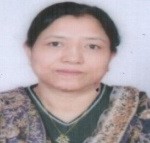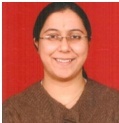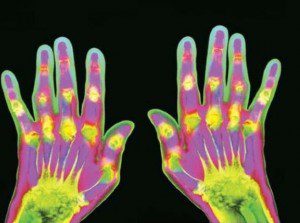By Dr. Rukamani Nair, Dr. Shivani Kachroo, & Dr. Ranjana Chawala
Guest Writers for Wake up World
Rheumatoid Arthritis (RA) is an autoimmune disease which 1% of the world’s population is known to suffer from. RA is an inflammatory, autoimmune disease that causes pain, joint stiffness (especially in the morning) and loss of function. Among all the commonly known arthritis conditions rheumatoid arthritis is the most serious. It can occur at any age but is seen more in persons over the age of 25 years and affects women more often than men.
The disease generally presents in a symmetrical pattern (both sides of the body), most often involving the hand joints. RA affects the whole body including several organs, so is described as a systemic disease. Progressive and irreversible joint damage is caused by the immune system attacking its own body tissues, particularly those lining the joints. Joint pain and swelling lead to structural deformities and disability causing a reduction in joint movement and muscle use. In turn, muscle size and strength decrease and the resulting abnormal forces on tendons cause deformity. The disease can also lead to problems with the heart, respiratory system, nerves and eyes. The underlying cause of the disease is not well understood. Rheumatoid Arthritis strikes people in different ways. In some cases, the disease starts suddenly over several days to weeks. For others, it progresses more gradually over a period of several weeks to months. In 10% of cases there may be periods of improvement which can last up to several years. In the majority of cases however, it becomes chronic. There may be periods of comparative remission where symptoms decrease markedly, but in the longer term, without effective treatment, the disease causes much damage and disability.
[pro_ad_display_adzone id=”110028″]
A study was undertaken at Bapu Nature Cure Hospital and Yogashram, Delhi to mark the efficacy of Naturopathy and Yoga in better management of RA. Total of 150 patients were taken, out of which 15 dropped out. Study participants were distributed into three groups. Group I – Naturopathy and Yoga plus Allopathic medications, Group II – Yoga plus Allopathic medication, Group III – only Allopathic Medicine. Both of the intervention groups were provided 80 sittings of yoga and Naturopathy over a period of one year. After performing yoga, patients were provided massage to the affected parts using warm sesame oil for 30 minutes.
This systemic rubbing with hands helped to nourish not only the parts acted upon but also the whole body by its known thermic and mechanical effects. It also increases the body metabolism. With this, the accumulated autoimmune crisis end products are eliminated gradually from the body leading to decreased levels of fatigue, pain, tenderness and swelling of the joints by improving biochemical markers, DAS28 score and functional capacity of the patients. This warm touch with hands also creates a sense of good feeling with relaxation of mind and body as it has a great impact on the peripheral nerve endings by producing a soothing, sedative as well as a restorative effect.
Massaging directly to the inflamed joint was avoided in the treatment course. During inflammation massage was given to the areas which are above and below the affected joints to reduce inflammation. All the patients of Group-1 had good relief in pain, swelling and stiffness of muscles after contrast fomentation* (see explanation below), which was given after massage. This improvement was given by the action and reaction of the contrast fomentation as water has many therapeutic effects like antianalgesic, antipyretic, sedative, derivative, stimulant, reflex, etc., thus, producing chiefly contraction and relaxation of the blood vessels leading decreased congestion in the joints. Hot & cold fomentation was provided to every patient for 11 minutes – hot fomentation for 5 minutes and cold fomentation for 30 seconds for two rounds, followed by a heating compress using a dry cotton cloth and woolen flannel for 10 minutes. The temperature of both hot fomentation (40 °- 45 °C) and cold fomentation (18 °- 26 °C) was controlled well during the treatment period.
On comparison of all the three Groups at baseline, patients were showing non-significant results and after 1st, 3rd, 6th and 12th months treatment, patients showed significant difference with decrease in morning stiffness, tenderness , fatigue, visual analog scale (VAS) and increase in sleep. A significant difference was also found with decrease in Disease activity score (DAS) 28 score and increase in functional capacity Health Assessment Questionnaire (HAQ). Among the Biochemical parameters of the patients it was concluded that there was significant difference between the three Groups in the SGPT, ALP, Total Protein, Uric Acid, Creatinine , TLC, Hemoglobin and ESR. But no significant differences were there for SGOT, albumin, total Bilirubin and urea between the three Groups.
Among all inflammatory markers studied in the patients were found to differ significantly between the three Groups. hs-CRP, TNF-alpha and ESR. Immunological markers of the patients studied were Rheumatoid Arthritis Factor, Anti-Cyclic Citrullinated Peptide and Anti Nuclear Antibodies. It was concluded that Rheumatoid Arthritic Factor, Anti-Cyclic Citrullinated Peptide in Group-1 were significantly different, indicating that Yoga and Naturopathy along with allopathic medication was useful in regression of the clinical manifestations of Rheumatoid Arthritis compared to Group-2 and Group-3. The RA factor was significant in Group, but among the three Groups the value was non-significant. The Anti-CCP and ANA were found non-significant between the three Groups.
Naturopathy is a form of alternative medicine based on a belief in vitalism, which highlights that a special energy called vital energy or vital force guides all bodily processes such as metabolism, reproduction, growth, and adaptation in which five basic natural elements, i.e. Earth, Water, Fire, Air and Ether are used as therapeutic measures.
Yoga is described as comprising a rich treasure of physical and mental techniques that can be effectively used to create physical and mental wellbeing. It is an ancient tradition that has its root in the early civilizations of the central Asian region. Its influence is seen in cultural traditions of many countries. In India it flourished as a vibrant way of life and a spiritual practice. Yoga is a tradition of lifestyle, health and spirituality that evolved in the Indian peninsula over a period of some 5000 years. Yoga is a holistic approach to life, which involves mind, body and spirit. Yoga asanas (physical postures) require undivided attention to breathing, which is the cornerstone of all yoga practices.
It is now recognized that early diagnosis, followed by aggressive treatment directed at controlling the disease process, is critical for the best outcome. Anyone experiencing symptoms that suggest Rheumatoid Arthritis – i.e. joint stiffness, painful and swollen joints and fatigue – should consult their general health practitioner at an early stage. Studies have shown that people who receive early treatment are more likely to be able to lead an active life, and are less likely to experience the type of damage that requires joint replacement. By partaking in regular Naturopathic treatment such as massage therapy, mud therapy, hot and cold fermentations and regular practice of yoga such as yogasanas and pranayamas, it was shown that the regular stimulation of the immune system resulted in significant improvements in pain and disability of the rheumatoid arthritis patient. Early use of disease-modifying anti-rheumatic drugs and biologics has improved outcomes but requires close monitoring of disease course and adverse events. These findings in the study will help to develop a natural regimen for the management of chronic rheumatoid arthritis condition in a scientific manner.
Non-pharmacologic measures form an important aspect of treatment of RA. Exercise is essential in maintaining joint mobility and muscle strength, and for management of fatigue. Weight loss decreases joint load in overweight patients and lessens pain. Yoga and relaxation techniques may reduce pain. Treatment of depression is important in the overall well-being of a patient with RA. In general, evidence for the effectiveness of complementary medicines (also known as alternative medicines) in Rheumatoid Arthritis is inconclusive as studies are often too small and are of short duration. Nevertheless, there is some evidence that certain supplements and natural therapies could have a role in managing the disease.
Thus, yoga and naturopathy treatments may offer the best hope of arresting arthritic condition and reversing normal health to patients. Yoga and Naturopathy treatments are cost effective and can be used effectively as an adjunct therapy in the treatment of Rheumatoid Arthritis.
The authors would like to thank ICMR for funding the research project, Dr. Amit Sharma as a senior Orthopedition, Mr. Prafull from Dept. of Statistics, Delhi University in rendering relevant support.
*A fomentation consists of a local application of moist heat to a body surface and can be applied a number of times in succession. This is the most effective means for relieving pain. The fomentation pad is usually made of blanket material, 50% wool to retain heat & 50% cotton to retain moisture, but towels can also be used.
About the Authors:
 Dr. Rukamani Nair is Medical Superintendent of Bapu Nature Cure Hospital and Yogashram, She is a Naturopathy Doctor from Osmania Univ. and Prinicipal investigator in this ICMR project of Rheumatoid Arthritis.
Dr. Rukamani Nair is Medical Superintendent of Bapu Nature Cure Hospital and Yogashram, She is a Naturopathy Doctor from Osmania Univ. and Prinicipal investigator in this ICMR project of Rheumatoid Arthritis.
 Dr. Shivani Kachroo is a Geneticist with a PhD in Human Genetics from MD Univ. Presently working at R&D Div of Bapu Nature Cure Hospital and Yogashram, Delhi. Actively involved in musculoskeletal disorders research.
Dr. Shivani Kachroo is a Geneticist with a PhD in Human Genetics from MD Univ. Presently working at R&D Div of Bapu Nature Cure Hospital and Yogashram, Delhi. Actively involved in musculoskeletal disorders research.
 Dr. RanjanaChawla is Scientist C at G. B. Pant Hospital Delhi. She has a PhD in Bio. Chemistry from PGIMER. She was the Co PI in this research team of ICMR project on Rheumatoid Arthritis.
Dr. RanjanaChawla is Scientist C at G. B. Pant Hospital Delhi. She has a PhD in Bio. Chemistry from PGIMER. She was the Co PI in this research team of ICMR project on Rheumatoid Arthritis.
[pro_ad_display_adzone id=”110027″]







